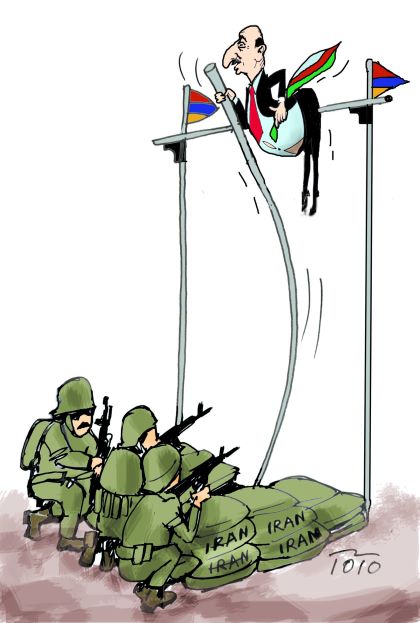Observers of the Caucasus had come to believe that with the restoration of Azerbaijan’s territorial integrity, as the latter kept calling it, the region could return to a peaceful era. Little did they know that the war between Armenia and Azerbaijan served as a prelude to new volatility in the region, because Azerbaijan was not alone in that war; Turkey openly participated in the conflict, Pakistan sent its military pilots and Turkey mobilized its hordes of Islamic mercenaries from Syria, while Israel guided its UAV weaponry from its own territory. Each participant harbored an agenda which came to the fore after the conflict.
At the present time, Turkey is well settled in the Caucasus after reaching an accommodation with Russia. Azerbaijan has become a captive nation under Turkish rule and its president, Ilham Aliyev, is all but a ventriloquist dummy to his master, President Recep Tayyip Erdogan. With the expansion of Azerbaijan’s border with Iran through gains in Armenia proper, Israel has broadened its surveillance capacity over the latter. Terrorist hub Pakistan is there to foment the kind of political horror which it has created in Afghanistan.
Russia is hopelessly fighting to maintain the status quo, which already has tipped the balance in Turkey’s favor. With the NATO garrison on Russia’s border in Poland and unrest in Ukraine and Belarus, in addition to the Turkish push in Central Asia to create a wedge between Russia and China, Moscow can ill afford a second Chechnya. Consequently, it has taken Ankara’s threat seriously that the latter can blow up the Russian Federation from within, using Russia’s 25 million Muslim population.
Russia’s inactivity and cautiousness was manifest in its foreign minister Sergey Lavrov’s cowardly statement that the Kremlin is not in a position to force the release of Armenian POWs in Azerbaijan, because they were captured after the declaration of November 9, buying into President Aliyev’s argument.
Within this political perspective, Ankara has been engaged in new initiatives using Azerbaijan as a tool. Azerbaijan’s newly-found belligerence is nothing but an obedient performance at Ankara’s bidding. At this time, Turkey has decided to provoke Iran into an open confrontation, motivated by more than one cause; Iran, like Armenia, is an impediment to Turkey’s pan-Turanist plans, therefore, it has to be destroyed. If strong countries such as Iraq, Syria and Libya crumbled under similar outside pressure, Iran’s destiny could also be in danger. It was no surprise that pro-government paper Yeni Safak in Turkey recently came up with the headline “Iran will Disappear from the Map.”
Ankara’s aggressive posturing intends to win the good graces of Washington, which has a stake in Iran’s fracture.










